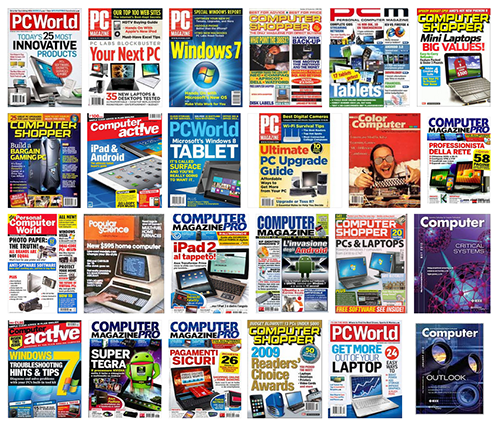 Funny what you can learn in an airport.
Funny what you can learn in an airport.
On a recent trip home from Boston with my dad, our flight was delayed. We killed some time checking out the airport newsstands, like we usually do, hoping to find a good computer magazine to read.
We couldn’t.
Among the rows and rows of titles, not one computer/PC magazine showed itself. I was shocked, even given the fact that PC World exited print in 2013. Surely there had to be a replacement of some sort, some unplugged edition on technology that could be tucked nicely into the seat pocket.
If there is, we couldn’t find it at Logan. A little bit of digging showed me what’s been going on in this niche of late:
- The industry standard bearer, PC World, shut down its print side last year after nearly 30 years, deciding to focus on digital editions and online content.
- PC Magazine went the digital route all the way back in February 2009, amid assurances that it would still “deliver the same magazine experience” on your PC (“tablet” editions weren’t even a thing then; that shows you how quickly this industry is changing). Of course, in the announcement, they assure readers that “Yes, you can print it. You can print as many pages of the magazine as you like.”
- Computer Shopper moved to an entirely online model the same year.
- Laptop Magazine went digital-only as of 2013.
What happened to all the computer magazines?
John Biggs of TechCrunch (and formerly Laptop) blames increased pressure from a slew of new online publishers and tech bloggers for eating away at the print market.
“While computer magazines – usually with DVDs attached – are still popular in areas with less developed Internet availability,” Biggs laments that with its digital saturation, “the U.S. has become a magazine wasteland, the only titles left on the newsstand being either general, mass-market news and gossip or amazingly niche titles that work best in print.”
“Remember that computer magazines were once amazingly, important just as blogs are now,” Biggs continues. “Many of us 1980s kids learned to program by typing in long strings of code from titles like Antic and Compute and even before I wanted to become a writer I idolized John Dvorak and Steven Levy, two tech writers who put a little bit of soul into their work.”
“I remember reading about the Morris Worm in PC Mag and salivating over items in the classifieds section at the back of the magazine where things like voice synthesizers and high-speed modems went for hundreds of dollars,” Biggs reminisces.
Harry McCracken of Time.com (who, incidentally, wrote for PC World for 13 years) agrees.
“The web has been awfully hard on magazines, and no category has suffered more than computer publications,” McCracken writes. “Both readers and advertisers have largely moved online. Many of them did so years ago — especially the sort of tech-savvy people who once read PC magazines.”
McCracken seems to be speaking directly to me when he writes “… with the possible exception of long trips on airplanes which don’t have wi-fi, I simply can’t think of a reason why anyone would want to read a monthly magazine about PCs and related products. And there’s no reason to feel sad about an obsolete product in the final stages of permanent long-term decline going away.”
Except we are sad. And we do take long trips on airplanes. And we like to read magazines even when there is wi-fi available. So we kept digging, knowing that surely there had to be enough of a market in this niche for a couple of good titles to remain.
And we found them.
Maximum PC is still enjoying a good print life, with its offering of tips and news for home computing enthusiasts. Macworld and Mac|Life are still in print too, in all their high-glossy techy splendor. And of course Wired Magazine, which is currently offering one of its crazy deals: subscribe to six issues and get a free hat. Sign me up.
Meanwhile specialty niches like gaming are hot, with the Official Xbox Magazine and PC Gamer going strong among a highly tech-savvy crowd.
In other words, the tech niche—like the industry in general—has evolved. And while the current disruption of the newsstand model might have something to do with the lack of titles on the shelves this summer, there is good news for print magazines that take the time to deeply understand their audience and provide high quality content that resonates with them.
